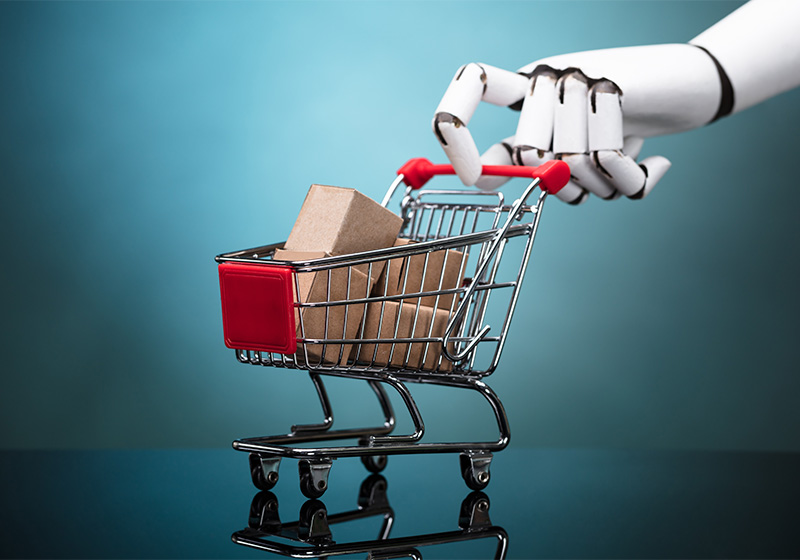Table of Contents
Artificial intelligence for e-commerce
Why artificial intelligence improves ROI in e-commerce
The market for artificial intelligence (AI) technologies is growing rapidly around the world. According to the latest figures for Europe, 41% of firms have already adopted an AI solution to increase productivity, cut costs and promote innovation.
The use of AI offers real opportunities for e-commerce businesses to grow, regardless of their size or sector. The real-time collecting and processing of large quantities of data on user behaviour enables firms to offer customers a personalised purchase experience, which is good for the bottom line. And AI can also simplify and increase the efficiency of many corporate processes and decisions, from the management of logistics and warehouses to the analysis of sales data and the planning of marketing strategies.
Through data-driven predictive analysis, online stores can make informed decisions, reduce human errors and costs, and accelerate growth through highly innovative services. Let’s take a look at some of the use cases for AI systems in the e-commerce world.
Virtual customer service
Virtual assistants are solutions that can understand natural language and provide customer support 24/7. From recommending the right product to managing orders and returns, AI chatbots can perform a wide variety of functions. The most sophisticated versions of these systems are an effective alternative to human sales assistants and help bring the online shopping experience ever closer to that enjoyed in bricks-and-mortar shops.
E-shops with good virtual customer service can speed up conversions, limit abandoned baskets by streamlining the checkout process and build customer loyalty with faster and more effective after-sales service. Paradoxically, AI can help to personalise and “humanise” the customer journey by filling the gaps between online and offline experiences.

Sales support
AI solutions can support the promotion and sale of products in e-shops through a series of advanced features. Let’s check out some of these.
Product suggestions
AI can track searches made by customers on your site and then provide personalised purchase suggestions, increasing conversions and average spend. Amazon has mastered this and is consistently able to show us items that match our interests or previous purchases.

Price optimisation
Artificial intelligence enables price differentiation for every product based on each customer’s propensity to purchase, date and time of visit, or place of residence. Some systems can also adjust prices based on parameters specified by the firm, such as market demand and competitors’ offerings.
Visual and vocal search
We all know how annoying it can be to scroll through the pages of an online store looking for a specific product. Manual or text searches can be time consuming and leave users longing for a human sales assistant to quickly answer their questions. That’s why eBay has rolled out an image search function that lets users upload a photo of what they’re looking and then uses AI to find similar items on the site.

Voice assistants are able to understand vocal questions from people and provide relevant answers, helping them navigate the site and choose the products that best suit their needs. Voice commerce technologies are the latest frontier in online shopping and an help businesses to further improve the user experience.
Inventory and warehouse management
Stock management is challenging for e-commerce operations: on the one hand, unsold stock tends to depreciate in value and cause losses for the firm. On the other, when a company sells out of a popular product, it results in lost earnings and unhappy customers, who may well take their business to the competition. AI technologies analyse all the factors that influence demand to predict sales performance, optimise and manage stock and replenishment, and reduce delivery times. Software and robots can also be used to automate and speed up warehouse operations, thus reducing labour costs.
AI marketing
By processing and analysing the enormous amount of data generated by online and offline sales channels, machine learning algorithms can help marketers to segment their target audience accurately and better target their marketing strategies. Albert, for example, is a piece of AI marketing software that can – all by itself – create multichannel campaigns based on data gathered from the target audience. Ginnie, on the other hand, can quickly and automatically create full and compelling product descriptions containing the most used key words.
The strength of these systems lies in their ability to quickly analyse high volumes of data in order to automate a series of tasks, from sending follow-up emails to users who have abandoned their basket to planning marketing campaigns. More advanced machine-learning algorithms can analyse the content of reviews, social media posts, survey responses and transcriptions of call centre conversations to generate content and services that better meet consumers’ needs.
Two success stories
North Face has created an AI-powered digital personal shopper that helps users to find the perfect item of clothing for them.
By asking a series of questions, the virtual assistant creates a buyer persona profile and then offers six suggestions that are ranked on well they match the customer’s needs. Thanks to this solution, the brand has significantly improved the average basket abandonment rate for its online store.

Cosmetics brand Sephora has launched Sephora Virtual Artist, a new augmented-reality tool – available on its website or app – which lets customers virtually try different products and follow digital beauty tutorials on their own face so they can create a given look. It also works using Messenger: users can send their photo to the chatbot, which then sends back an image showing what they will look like after they’ve applied the item recommended.
AI-powered systems can make e-commerce processes and decision-making more efficient and effective, thereby driving sales and cutting costs. The challenge for every business is identifying the best tools for enhancing the customer journey and building customer loyalty.

